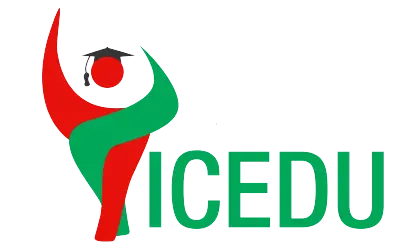Call for Papers
- Home
- Call For Papers
- Abstract Guidelines
For over a decade, Education Conference has served as a leading international forum bringing together researchers, educators, practitioners, and change agents committed to transforming education. ICEDU 2026 invites thought-provoking papers that explore innovative, inclusive, and sustainable approaches to education, fostering meaningful dialogue and global collaboration to shape equitable and empowered learning communities.
How We Achieve This:
The conference will feature:
- Insightful keynote speeches, expert panels, and interactive workshops
- Platforms for research presentation, knowledge exchange, and cross-sector networking
- Dedicated sessions for capacity building, policy development, and implementation-focused discussions
Together, we seek to translate ideas into action and build a healthier, more equitable world through shared knowledge, innovation, and collaboration.
We are delighted to invite academics, researchers, policymakers, practitioners, activists, legal professionals, and allies to submit their original contributions to the 12th International Conference on Education (ICEDU 2026). Join us in shaping inclusive, feminist futures through research, dialogue, and transformative action.


Conference Theme: “Transforming Education for a Sustainable and Inclusive Future: Adaptive Teaching, Innovative Research, Local and Global Partnerships, and Policy Implications”
Key Paper Submission Tracks and Sub Tracks:
- Acoustics in Education Environment
- APD/Listening
- Counsellor Education
- Courses, Tutorials and Labs
- Curriculum Design
- Inclusive Education and Practices
- Research Methodologies
- Academic Research Projects
- Developing Research & Experimental Work
- Links between Education & Research
- Research in Education
- Research Management
- Digital Literacy
- From Pencils to iPad: Advances in Instructional Technology
- Levels of Technology Implementation
- Teaching with Technology
- Technology and Literacy
- Artificial Intelligence in Education (AIED)
- Applying Psychological Theories to Classroom Instruction
- Developments in Teacher Preparation
- Entrepreneurial Skills
- Implementing Innovative Practices
- Inquiry-Based Instruction
- Professional Development for Educators
- The Role of the Principal in Fostering Academic Achievement
- Adaptability
- Assessment in E-Learning
- Design and Development of Online Courses
- Effective Learning Strategies
- E-Learning Software Architecture
- Virtual Learning Environments (VLEs)
- Assessing School Outcomes
- Assessment Software Tools
- Causal Modelling in the Classroom
- Culturally Relevant Assessments
- Measuring Teacher Quality
- Using Tests to Advance Learning
- Early Childhood Education
- Home Education
- Elementary Education
- Primary Education
- Secondary Education
- Comparison of Education in Different Countries
- Counsellor Education
- Educational Foundations
- Education Practice trends and Issues
- Education and Research Management
- Educational Measurement and Evaluation
- Curriculum, Research and Development
- Identifying Inequity
- Fostering Equitable Practices
- Bias in Education
- Equity-Focused Research
- Consequences of Educational Inequity
- Building and Sustaining an Inclusive Community
- Children’s Rights in Education
- Disabilities and Diversity
- Special Education
- E-Accessibility
- Policy Development and Implementation
- The Role of Government in Education
- Educational Reforms and Innovations
- Policy Impact on Educational Equity
- Advocacy and Lobbying for Education
- Global Perspectives on Education Policy
- Data-Driven Policy Making
- Partnerships between Public and Private Sectors in Education
- Inclusive Teaching Practices
- Remote and Hybrid Learning Models
- Strategies for Reducing Dropout Rates
- Community and Family Involvement in Education
- Leveraging Technology for Student Engagement
- Supporting Underrepresented and Marginalized Students
- Access to Higher Education Opportunities
- Financial Aid and Scholarship Programs
- Education, Research and Globalization
- Women and Minorities in Science and Technology
- Indigenous and Diversity Issues
- Government Policy issues
- Increasing Affordability and Access to the Internet
- Intellectual Property Rights and Plagiarism
- Globalization
- Global Challenges of Education
- Organizational, Legal & Financial Aspects
- Government Policy Issues
- Impacts of Economic Crisis
- Education for Sustainability
Abstract Guidelines
Basic Format for Abstracts
- An abstract is a compendious summary of a research paper’s substance including its background, purpose, methodology, results, and conclusion.
- It should be one paragraph with a word limit of 175-275.
- Keywords should be provided as a must (no more than 06 words).
- Keywords should be written in lowercase letters (Not applicable to names/scientific names) and should be separated with commas.
- Please do not include subheadings, bullets, lists and header/footer in the abstract.
- Abstract titles should be short, but descriptive. Informative titles, indicating key points are encouraged. Abbreviations should not be used in the title.
- Acronyms should be written in full the first time, mentioned in the text, followed by the abbreviation in parentheses.
- Always follow SI Units.
- Scientific names must be in Italic.
- Use a negative exponent (e.g. kg m-3) and do not indicate units as divisions (e.g. kg/m3). Chemical formulae should be written in a standard form such as “CaCO3”, not as “CaCO3”. Use a zero before decimal points such as “0.45,” not “.45.”
- There shall be no citations or references in the abstract specifically. If there is a need to cite references, please provide the sources in brackets.
About the Reviewing Process
- Your abstract will undergo a double-blind peer review by the International Scientific committee after its receipt.
- Results of the abstract review will be sent to the author within two weeks of submission.
- The Conference Chair serves as the head of the scientific committee and will take the final decision on abstracts.
- Acceptance or rejections of the paper will be sent to you with reviewer comments.
- If a revision is required, the revised abstract must be sent back within a week.
- If your abstract is accepted, you will be invited to register for the Conference.
Font
- Title: Times New Roman, 12 points, Upper case, Centered text in bold
- Body: Times New Roman, 11 points; Line spacing: 1, one column of text
Affiliations
- Affiliations should be indicated with superscript Arabic numbers appearing at the end of surname/family name.
- A superscript asterisk shout be used for the corresponding author
- Names of affiliations should be given including the country.
- If there is more than one name and address, they should be related by superscript numbers.
- Eg:- Surname INITIALS1, Surname INITIALS1* and Surname INITIALS2 1Department, Faculty, University, Country 2Department, Institute, Country *author@gmail.com (*Email address of the corresponding author)
General Instructions
- Abstracts should represent the original work.
- Informative abstracts and critical abstracts are accepted.
- The Abstract should be written in English.
- Please indicate one – three most relevant themes for your abstract from the conference tracks.
- Please send in a brief biography together with the Abstract (An example is given in the abstract template).
- Please download the abstract template and follow the format carefully.
- Documents that do not conform to the guidelines will be asked to be revised.
- Documents received after the given deadline, due to any reason will not be accepted unless the deadline is extended.
- The abstract should be submitted in the format of MS Word (.doc or .docx) document.
Important information for the Co-Authors
- Please note a single registration permits only one person to attend the conference
- If the co-authors would like to attend the conference their registration and payment are required to be made independently.
- However, they will be given a discount of 15% from Non-Presenter’s (Listener’s) Registration Fee.
- The certificate will be issued to the co-authors upon their registration/payment for the conference.
- Please make prior communications with the organizing committee regarding this matter to enjoy the benefit of the discount.
If you are not hearing from us
- Please set your spam filter to accept message from secretariat@educationconference.co
- Contact the main conference coordinator at secretariat@educationconference.co in case you do not receive an acknowledgment/follow-up email within 48 hours after your registration or inquiry.
- Please check your spam/junk folder prior to making inquiries regarding your concern.
- Make sure to provide your mobile phone number in your registration form along with your abstract for further communications
You may send your abstract according to the Paper Submission Tracks & abstract guidelines. Different registration packages of the conference provide you so many benefits including food, conference pack, abstract book, eligibility to attend the technical sessions, career development workshops, publication opportunities etc. You can select different presentation modes according to your preference. Presentations awards are one of the key elements of the conference. The presenters at the conference will be evaluated by a special committee of academic experts during the conference and the best presenters will be awarded at the award ceremony.
